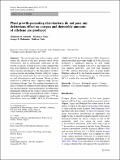| dc.contributor.author | Olubukola O Babalola, Abiodun I Sanni, George D Odhiambo, Baldwyn Torto | |
| dc.date.accessioned | 2020-07-29T08:27:18Z | |
| dc.date.available | 2020-07-29T08:27:18Z | |
| dc.date.issued | 2007-06-01 | |
| dc.identifier.uri | https://repository.maseno.ac.ke/handle/123456789/1685 | |
| dc.description.abstract | The use of trap crops such as cowpea could reduce the effects of the root parasitic weed, Striga hermonthica and its subsequent constraints on the growth of cereals. Certain bacteria could augment the trap crop stimulatory effect. We studied the effect of three bacteria introduced to the rhizosphere of three cowpea varieties at planting. Number of days to cowpea flowering was noted and at harvest, data were collected on pod characteristics and biomass. Means of data subjected to ANOVA were compared using Tukey’s Studentized Range Test. We analysed bacterial headspace volatiles for ethylene by gas chromatography and gas chromatography–mass spectrometry. Bacterial type significantly influenced the cowpea varieties with better performance over the non-inoculated control. Average pod weight (g) with bacterial treatment was 37.97 for Enterobacter sakazakii 8MR5, 34.38 for Pseudomonas 44MS8 … | en_US |
| dc.publisher | Kluwer Academic Publishers | en_US |
| dc.title | Plant growth-promoting rhizobacteria do not pose any deleterious effect on cowpea and detectable amounts of ethylene are produced | en_US |
| dc.type | Article | en_US |

